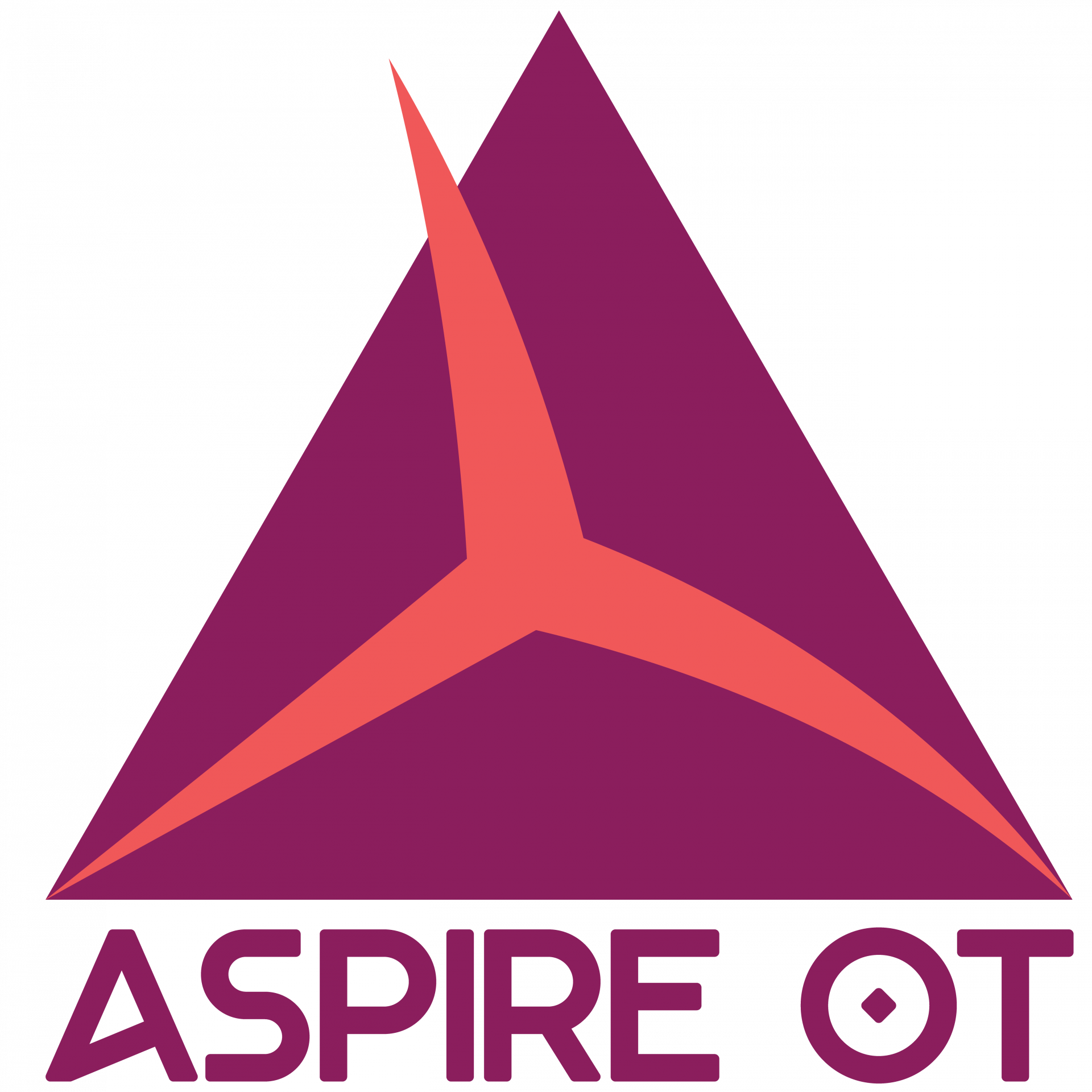
With
graduation season here and so many OT practitioners considering changes in
their career, I thought it might be interesting to talk about the setting that
I currently practice in: acute care OT. Acute care occupational therapy was love at first “site” for me
over 10 years ago when I was doing my first level II field work as an OTA
student. I have also enjoyed working in other settings, but acute care OT always
feels like home to me.
Keep reading to learn:
Over the years, my passion for acute care OT has only grown stronger. While every OT setting has its unique rewards, there's something truly special about the dynamic and fast-paced nature of acute care. It offers an opportunity to make a profound impact during a critical time in patients' lives. Let me share with you some of the reasons why this setting continues to inspire me and why it might capture your heart, too.
I also thought I should maybe pair the above top 10 reasons I love acute care with some challenges I feel that acute care OT offers:
While there’s so much to love about working in acute care OT, I know it can also feel overwhelming, especially for those who are new to this setting. The fast pace and complexity can challenge even experienced practitioners. But the good news is that confidence in acute care isn’t something you either have or don’t—it’s something you can build. Let’s dive into some resources and strategies that can help you feel more prepared and empowered in this rewarding field.
1. Find courses that address acute care OT specifically. This is where you will get the most bang for your time and money. You know that the content is directly applicable. Aspire OT has a upcoming webinar designed to address the questions and concerns of OTs and OTAs considering or entering the acute care OT setting.
2. Identify skills that will help you as an acute care OT practitioner and work to develop those skills. Courses can be a great way to do this. At Aspire OT, we have many great courses for OT practitioners working in acute care OT:
Medication Management
Clinical Reasoning
Addressing Acute Pain
Addressing Chronic Pain
Dementia
Fine Motor for Stroke Rehabilitation
Motivational Interviewing
OTA and OT Supervision and Collaboration
Understanding Trauma
Addressing Mental Health
3. Find a mentor. Use your networking skills (hello, your state OT association!) to find a mentor who is working in acute care OT. This can be invaluable! If you are already working in acute care, you can check with your co-workers to find an OT practitioner who will mentor you.
4. Read a book. AOTA has a specific resource book for acute care OT. You can also search Amazon or other book sellers for resource or pocket guides.
Keep reading to learn:
- Reasons to love acute care an acute care OT setting
- Challenges for working in an acute care OT setting
- Ways to build your confidence as an acute care OT practitioner
Over the years, my passion for acute care OT has only grown stronger. While every OT setting has its unique rewards, there's something truly special about the dynamic and fast-paced nature of acute care. It offers an opportunity to make a profound impact during a critical time in patients' lives. Let me share with you some of the reasons why this setting continues to inspire me and why it might capture your heart, too.
- I love the autonomy that I have in acute care. I can use my clinical judgment (and some guidance from department policies) to structure how I tackle my list of clients for a day. When I am with a client, my clinical judgement also determines how much therapy the client will tolerate. Obviously, I need to ensure I am following the rules and regulations for OTAs including collaborating with the occupational therapists I work with, but I do feel that acute care OT is a setting where it is much easier to practice at the top of my license.
- Acute care OT is a team environment. While I like structuring my day, I also love being able to collaborate for better client outcomes. In a single day, I may be co-treating with physical therapy, discussing discharge recommendations or family dynamics with the case manager, following up with a nurse about safety concerns, and/or touching base with a speech language pathologist about observations on a client that I addressed self-feeding as an intervention. Communication and collaboration are essential in the acute care OT setting.
- Acute care OT makes it easy to do occupation-based treatments. I believe in using occupation as a treatment as much as is appropriate for the client. Honestly, I think it is appropriate for a lot of our treatment time. For some clients, basic ADLs are a struggle so we can use the occupations to facilitate rehabilitation or compensation for deficits to improve performance. Other clients may be able to do their basic ADLS so we can move towards higher-level tasks such as bed making, organizing their possessions in the room, crafting, or an approved venture down to the gift shop.
- Acute care OT offers change and variety. Some folks like the routine of similar tasks at work every day. There is nothing wrong with that at all. I am just not that person. I love the variety in the needs and diagnoses of the clients that I see in acute care. Every day brings challenges and lots of opportunities for critical thinking and clinical judgment.
- I enjoy using my observation skills. An OTA or OT’s power of observation is an important part of the occupational therapy skillset for any setting. I do feel that in acute care OT my observation skills are even more critical. I need to be watching my client for anything that might indicate a change in medical status during our treatment so I can act accordingly to keep the client safe. I want to observe them for clues that may give me insight into their challenges, motivations, and other psychosocial factors. I also want to ensure that I am capturing those measurable performance elements so I can talk to the client, the treatment team, and document the progress that the client is making.
- I have daily opportunities for advocacy. Listen folks, we have a lot of work to do to advocate for our profession! Do you know how many times a day I walk into a room and the client (or even a staff member) calls me a PT? Of course, you do because it happens to you too!! Acute care OT gives me the chance to get ahead of those misconceptions as much as possible. I can clearly identify myself as an OTA ready for their occupational therapy for the day. I can clearly convey why OT is important to their lives and the challenges they face at the time. (“It sounds like you are feeling that your pain is overwhelming right now if you’d like we can make that the focus of occupational therapy today because in OT we want to focus on helping you manage the things that get in the way of what you want to do”). I also review this importance at the end of the session and ask how satisfied they were with the treatment.
- I have the privilege of serving the client when they are oftentimes at their most vulnerable. Let’s be honest. The hospital is oftentimes a scary place for clients with a lot of unknown and potentially frustrating factors:
- Clients may not be sure what is the cause of their symptoms.
- Many providers are coming in and out of their room at all hours.
- The client may also not be sure when they will go home or how they will manage at home
- This list could go on and on.
- One treatment for even just twenty-three minutes can make a huge difference. One of the biggest criticisms of acute care OT that I have heard is that you aren’t able to have a relationship with the client over a longer period of time as in other settings. Relationships are important to me, but I always have felt satisfied with the ability to connect with a client even for one treatment. Hospitalized clients need to feel heard. They have a lot of different providers in and out of the room all day. I love and am so grateful that I can use even one treatment to help empower the client and part of that is building a therapeutic relationship with the client in that short time.
- I am able to address cognition more frequently than in my experience in other settings. Let me be clear, I think OT practitioners can address functional cognition in any area that they practice. I have just found that I can address it more frequently in acute care OT than in other settings I have practiced in. With discharge recommendations being a focus of acute care, there are many times when occupational therapy may be determining the safety of recommendations being made. This means that I could be giving standardized cognitive assessments for the OT to interpret or working with the client on functional tasks in order to address cognition as a component or to discuss the client's performance with the OT for safe discharge recommendations.
- Change can happen quickly in acute care OT. Now, this is not a rule or an all-the-time statement. There are clients that are slower to progress and even can have long lengths of stay on an acute care caseload, but some clients do improve quickly as the medical care and therapy really come together to benefit the client.
I also thought I should maybe pair the above top 10 reasons I love acute care with some challenges I feel that acute care OT offers:
- It is a physically demanding job. You do have to physically assist some of the clients.
- Attention to detail is key as the important variables may be changing. A client and their medical status may vary from moment to moment. You must be prepared and quick to act based on what is going on around you.
- You are helping clients doing basic ADLs while they are typically feeling unwell. This means that things can get messy sometimes. We want to be professional and respectful of the client during any situation. I find this to be part of the job, and I grew okay with the sights and smells pretty quickly.
- You can also be very busy sometimes and not look very productive on paper. You could check with 5 different clients for OT and not be able to see anyone and have billable time. I’ve always found that facilities understand this aspect though.
While there’s so much to love about working in acute care OT, I know it can also feel overwhelming, especially for those who are new to this setting. The fast pace and complexity can challenge even experienced practitioners. But the good news is that confidence in acute care isn’t something you either have or don’t—it’s something you can build. Let’s dive into some resources and strategies that can help you feel more prepared and empowered in this rewarding field.
1. Find courses that address acute care OT specifically. This is where you will get the most bang for your time and money. You know that the content is directly applicable. Aspire OT has a upcoming webinar designed to address the questions and concerns of OTs and OTAs considering or entering the acute care OT setting.
2. Identify skills that will help you as an acute care OT practitioner and work to develop those skills. Courses can be a great way to do this. At Aspire OT, we have many great courses for OT practitioners working in acute care OT:
Medication Management
Clinical Reasoning
Addressing Acute Pain
Addressing Chronic Pain
Dementia
Fine Motor for Stroke Rehabilitation
Motivational Interviewing
OTA and OT Supervision and Collaboration
Understanding Trauma
Addressing Mental Health
3. Find a mentor. Use your networking skills (hello, your state OT association!) to find a mentor who is working in acute care OT. This can be invaluable! If you are already working in acute care, you can check with your co-workers to find an OT practitioner who will mentor you.
4. Read a book. AOTA has a specific resource book for acute care OT. You can also search Amazon or other book sellers for resource or pocket guides.
5. Read articles. Search for articles related to acute care OT like this one from AOTA.
Whether you’re just starting your journey in acute care or are looking to deepen your skills, this setting has so much to offer for both professional growth and personal fulfillment. It’s a place where we, as OT practitioners, can make an immediate and meaningful difference in patients’ lives during some of their most vulnerable moments. I hope this has inspired you to embrace the opportunities and tackle the challenges with confidence. Remember, every step you take to grow your knowledge and skills not only benefits your clients but also strengthens you as a practitioner.
Occupational Therapy CEUs to Grow Your Acute Care Practice
Aspire OT has a variety of continuing education courses to support your practice. Our discussion boards allow learners to interact with the instructor.
Don't Miss A Thing!
Follow us on social media to stay up to date on all of our latest postings.
Join our newsletter
Get weekly updates on new blog posts, webinars, on-demand courses and more right in your mailbox.
Thank you!
Write your awesome label here.
Coaching, JUST for OT Practitioners!
Do you feel like you need more mentorship and feedback in your clinical practice?
Just for OT Coaching is here to help you! Let Kim and Niccole share their experiences to help you feel more supported and grow your practice.'


